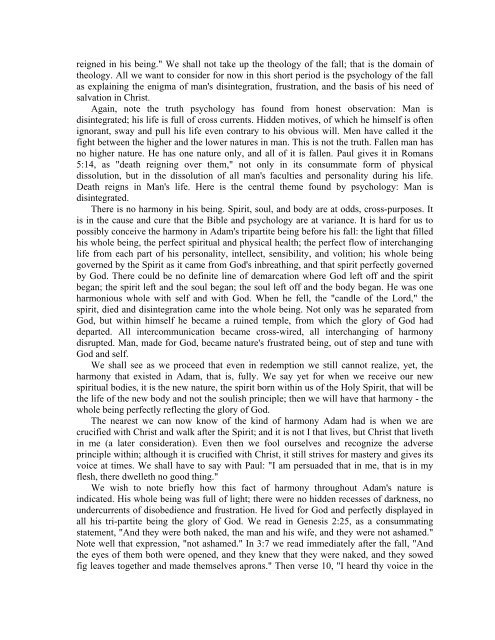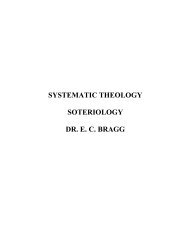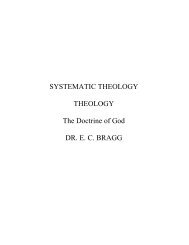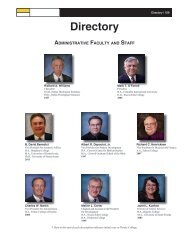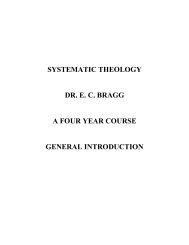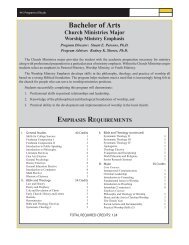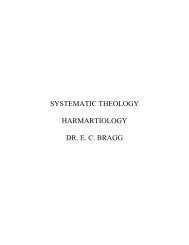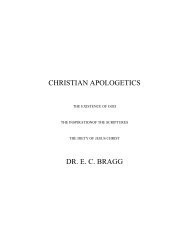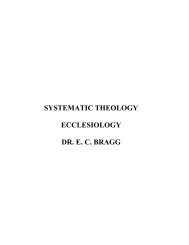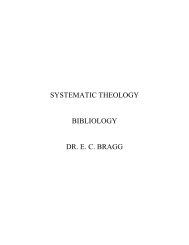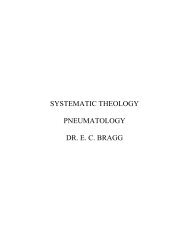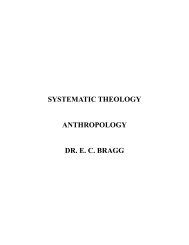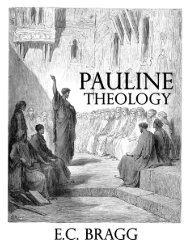CHRISTIAN PSYCHOLOGY DR. E. C. BRAGG - Trinity College
CHRISTIAN PSYCHOLOGY DR. E. C. BRAGG - Trinity College
CHRISTIAN PSYCHOLOGY DR. E. C. BRAGG - Trinity College
Create successful ePaper yourself
Turn your PDF publications into a flip-book with our unique Google optimized e-Paper software.
eigned in his being." We shall not take up the theology of the fall; that is the domain of<br />
theology. All we want to consider for now in this short period is the psychology of the fall<br />
as explaining the enigma of man's disintegration, frustration, and the basis of his need of<br />
salvation in Christ.<br />
Again, note the truth psychology has found from honest observation: Man is<br />
disintegrated; his life is full of cross currents. Hidden motives, of which he himself is often<br />
ignorant, sway and pull his life even contrary to his obvious will. Men have called it the<br />
fight between the higher and the lower natures in man. This is not the truth. Fallen man has<br />
no higher nature. He has one nature only, and all of it is fallen. Paul gives it in Romans<br />
5:14, as "death reigning over them," not only in its consummate form of physical<br />
dissolution, but in the dissolution of all man's faculties and personality during his life.<br />
Death reigns in Man's life. Here is the central theme found by psychology: Man is<br />
disintegrated.<br />
There is no harmony in his being. Spirit, soul, and body are at odds, cross-purposes. It<br />
is in the cause and cure that the Bible and psychology are at variance. It is hard for us to<br />
possibly conceive the harmony in Adam's tripartite being before his fall: the light that filled<br />
his whole being, the perfect spiritual and physical health; the perfect flow of interchanging<br />
life from each part of his personality, intellect, sensibility, and volition; his whole being<br />
governed by the Spirit as it came from God's inbreathing, and that spirit perfectly governed<br />
by God. There could be no definite line of demarcation where God left off and the spirit<br />
began; the spirit left and the soul began; the soul left off and the body began. He was one<br />
harmonious whole with self and with God. When he fell, the "candle of the Lord," the<br />
spirit, died and disintegration came into the whole being. Not only was he separated from<br />
God, but within himself he became a ruined temple, from which the glory of God had<br />
departed. All intercommunication became cross-wired, all interchanging of harmony<br />
disrupted. Man, made for God, became nature's frustrated being, out of step and tune with<br />
God and self.<br />
We shall see as we proceed that even in redemption we still cannot realize, yet, the<br />
harmony that existed in Adam, that is, fully. We say yet for when we receive our new<br />
spiritual bodies, it is the new nature, the spirit born within us of the Holy Spirit, that will be<br />
the life of the new body and not the soulish principle; then we will have that harmony - the<br />
whole being perfectly reflecting the glory of God.<br />
The nearest we can now know of the kind of harmony Adam had is when we are<br />
crucified with Christ and walk after the Spirit; and it is not I that lives, but Christ that liveth<br />
in me (a later consideration). Even then we fool ourselves and recognize the adverse<br />
principle within; although it is crucified with Christ, it still strives for mastery and gives its<br />
voice at times. We shall have to say with Paul: "I am persuaded that in me, that is in my<br />
flesh, there dwelleth no good thing."<br />
We wish to note briefly how this fact of harmony throughout Adam's nature is<br />
indicated. His whole being was full of light; there were no hidden recesses of darkness, no<br />
undercurrents of disobedience and frustration. He lived for God and perfectly displayed in<br />
all his tri-partite being the glory of God. We read in Genesis 2:25, as a consummating<br />
statement, "And they were both naked, the man and his wife, and they were not ashamed."<br />
Note well that expression, "not ashamed." In 3:7 we read immediately after the fall, "And<br />
the eyes of them both were opened, and they knew that they were naked, and they sowed<br />
fig leaves together and made themselves aprons." Then verse 10, "I heard thy voice in the


